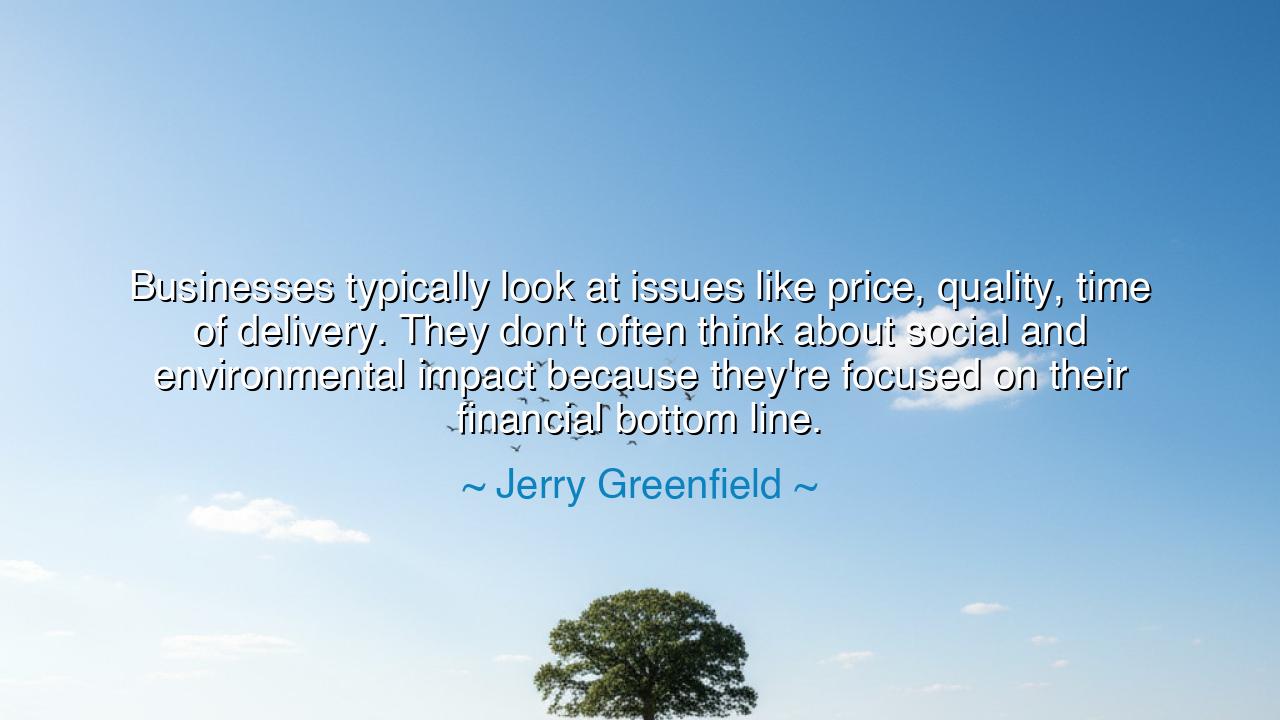
Businesses typically look at issues like price, quality, time of
Businesses typically look at issues like price, quality, time of delivery. They don't often think about social and environmental impact because they're focused on their financial bottom line.






Jerry Greenfield, the co-founder of Ben & Jerry’s, once uttered a truth both sharp and enduring: “Businesses typically look at issues like price, quality, time of delivery. They don’t often think about social and environmental impact because they’re focused on their financial bottom line.” At first, these words may sound like a simple observation about commerce, but beneath them runs an ancient current: the struggle between wealth and wisdom, between short-term gain and the long arc of responsibility.
To speak of price, quality, and time of delivery is to speak of the measures most visible to buyers and sellers. These are the stones upon which the markets of the world are built, and they cannot be dismissed. For even in the marketplaces of ancient Babylon or Athens, merchants competed on the cost of grain, the durability of cloth, and the speed of trade. Yet Greenfield warns us that when these measures alone dominate the minds of leaders, something greater is forgotten: the earth itself, and the society that sustains both buyer and seller alike.
The neglect of social and environmental impact is not new. History is filled with nations and empires that devoured their own foundations in the pursuit of profit. Consider the Roman Empire, whose insatiable hunger for resources stripped lands bare, exhausting soil and forest alike. Or the early days of the Industrial Revolution, when smoke darkened skies, rivers ran black with waste, and workers were driven into despair. Wealth grew, yes, but at the cost of the people and the earth—and in time, the imbalance led to unrest, reform, and collapse.
Yet history also shows the opposite: leaders and communities who chose wisely, blending prosperity with stewardship. The Iroquois Confederacy, for example, taught that decisions should be made with the “seventh generation” in mind. They knew that the land, air, and water were not merely resources but sacred trusts. Their wisdom echoes Greenfield’s point: that businesses, too, must widen their vision beyond the narrow bottom line, lest they consume the very soil upon which they stand.
The heroic heart of Greenfield’s words lies in the challenge to redefine success. To focus only on profit is to measure with a broken scale. True prosperity must balance the coin with the conscience, the ledger with the land. For what is wealth if the rivers are poisoned? What is gain if workers are crushed in spirit? What is the bottom line if the foundation of society and earth is eroded? The ancients would call such gain folly, and wisdom demands that we see it the same.
The lesson, then, is not only for corporations, but for each of us. In our work, in our purchases, in our choices, we are participants in the great exchange of resources and values. If we choose only what is cheap, fast, and convenient, we fuel the cycle Greenfield warns against. But if we look also to the social and environmental impact, we begin to shift the measure of what matters. By supporting businesses that honor people and planet, by practicing stewardship in our own lives, we join the chorus of those who seek lasting prosperity, not fleeting gain.
So let these words be your guide: expand your vision. Do not be blinded by price alone, nor seduced by speed without substance. Ask of every choice: does it honor the earth? Does it respect the dignity of others? Does it sustain more than it consumes? If you live this way, you will not only thrive in your own life, but also help turn the tide of commerce toward wisdom. For in the end, the true bottom line is not profit, but the survival and flourishing of the world that gives us life.
Thus, Jerry Greenfield’s reminder becomes a call to action: let business and life alike be guided not merely by the market, but by conscience. Let us be builders not only of wealth, but of justice, harmony, and balance. For only then will prosperity endure, and only then will the generations to come bless our names rather than curse our memory.






AAdministratorAdministrator
Welcome, honored guests. Please leave a comment, we will respond soon